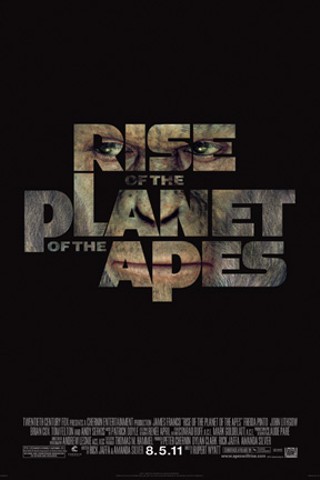Quite a few movie franchises have gotten "reboots" in recent years, with varying degrees of success. While films like A Nightmare on Elm Street and Superman Returns didn't necessarily go over big with the public, Star Trek and Batman Begins breathed new life into entertainment juggernauts.
Rise of the Planet of the Apes does for the Apes franchise what the new Trek and Batman films have done for their respective properties: It makes the prospect of further movies something to eagerly anticipate.
I was not a hater of Tim Burton's 2001 Planet of the Apes. I thought he did a great job with the practical makeup, and the story was OK. In retrospect, the film lacked pop, but it entertained, for the most part.
Fans of the Ape franchise fondly remember 1972's Conquest of the Planet of the Apes, the third sequel, which came after Escape From the Planet of the Apes (which ended with the baby chimp saying, "Momma!"). The new Rise has a plot that is most similar to Conquest, with some major changes.
In the original franchise, apes became pets after a worldwide disease decimated the dog and cat populations. Over a stretch of time, apes became smarter by hanging around with humans and doing their dishes. They eventually said, "Slavery sucks!" and took over the world.
In Rupert Wyatt's new film, James Franco plays Will Rodman, a scientist (there are no astronauts in this one) who is testing a drug to cure Alzheimer's disease in chimps. The drug, as it turns out, not only has the ability to repair a damaged brain; it makes the brain stronger and smarter.
After a chimp freaks out, Will's experiment is suspended, and all of the test chimps are supposed to be killed. Franco sneaks one baby out of the facility, the offspring of a chimp who was taking the drug.
That chimp turns out to be Caesar, wonderfully played by Andy Serkis through motion-capture CGI. Serkis, of course, is no stranger to the technology, having played Gollum and King Kong in the past. Through extraordinary help from Weta (the folks who make Peter Jackson's special-effects-laden films come to life), Serkis gives one of the summer's more memorable performances.
The keyword for Serkis' performance here would be "expressive." Caesar (played memorably by Roddy McDowell in Conquest) alternately breaks your heart and scares the crap out of you. Watching him progress from a joyful, carefree, intelligent chimp into a disgruntled prisoner who has had enough of humans is a riveting experience.
As Caesar grows, his face gets a little more jaded, his posture more rigid. By the film's end, he has become quite the badass ... and more human.
Franco, who publicly chastised the film a couple of weeks ago and predicted critics would hate it, was wrong about himself and the CGI creations. He's very good in this movie, lending the film instant credibility as a sensitive scientist who is also undeniably vain and reckless. His Will Rodman is a nice, well-meaning fellow who just happens to be the root cause of the ape apocalypse.
The film takes nasty shots at American corporations (no surprises there), and the horrors of animal testing and animal captivity. (This is something the recently released documentary Project Nim, about an actual chimp, also does.) Not every chimp in captivity is being cared for by the likes of Draco Malfoy (Tom Felton of Harry Potter fame plays a nasty animal-keeper), but logic dictates that primates are generally better off in the wild than they are sitting in cages waiting to be blasted with experimental drugs.
The movie has a lot of CGI, and not every shot is picture-perfect. I'm thinking another few months of work could've sharpened a few edges. Nothing in Rise looks supremely bad; it's just that some moments have Caesar and the other apes integrating marvelously with human actors, while others look animated and slightly fake.
There's a nice, action-packed finale on the Golden Gate Bridge that leaves things wide open for the inevitable sequel. Not to give much away, but it looks like the new writers have come up with a plausible way to continue the series with humans becoming subservient to apes. I'm very curious to see what happens next.
If Apes purists are out there thinking the franchise will lose its edge with the loss of humans playing apes under pounds of makeup, fret not. This new take on the series provides some serious spark and opens the door to a wide range of possibilities.
Those purists might grouse a bit, but in the case of Rise of the Planet of the Apes (a lot of "ofs," I know), the purists should just shut their pie holes. The movie is good, proving that Apes movies don't require massive prosthetics and Charlton Heston.











